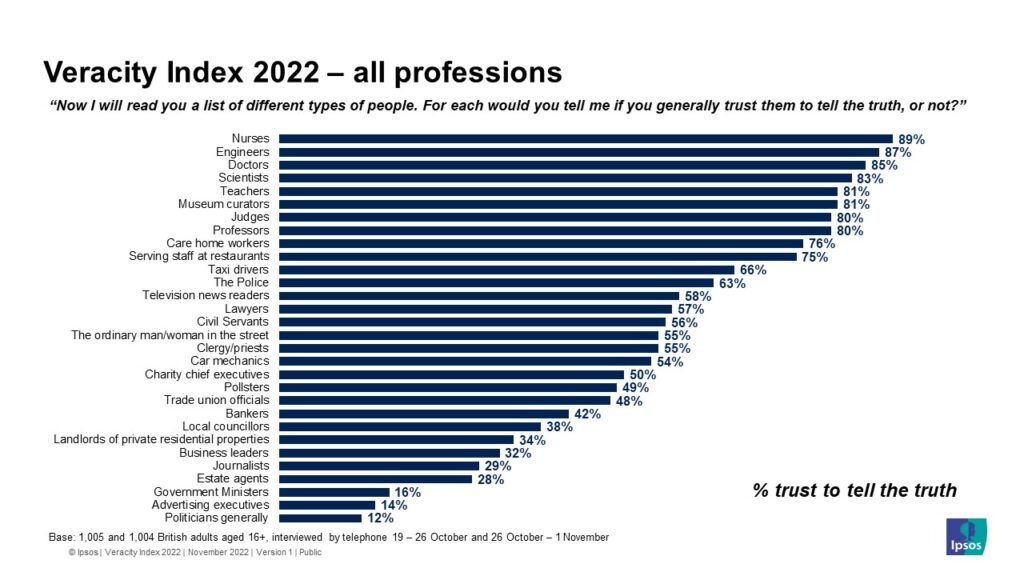In 2022, Ipsos conducted a survey in the UK, asking people to state whether they expect people in various professions to tell the truth.

As you can see, nurses are the most trustworthy, followed by engineers, and doctors. However, at the very bottom, you find “general politicians,” and only slightly less mendacious scumbags: advertising executives.
86% of those surveyed believe advertising people are liars. No one is surprised by this, not a single person on the planet. Why is this perception so persistent? Let’s examine:
You: “Hey, what are you doing?”
Engineer: “I’m erecting a building according to the laws of physics, materials science, and some advanced mathematics that ensures its structural integrity and function.”
You: “Hey, what are you doing?”
Advertising person: “I’m gaining some deep—and I mean really deep—actionable insights by asking some consumers questions that were brainstormed by agency people, then we’ll interpret the responses—we’re data-driven, you know—so we can use our intuition to come up with a high-impact creative idea for a 360 omnichannel execution!”
Now it becomes clearer.
Imagine a structural engineer licking his thumb, raising it to the wind, then saying, “Yeah, we’re really gonna measure the hell out of those steel beams! Mac, what do you think, ten feet or ten meters?”
When people do what they say they are going to do, they are trustworthy, or veracious. Ipsos titled their study the Veracity Index. Veracity = conforming to facts, accurate.
When you are full of shit and repeatedly perpetrate falsehoods while stewarding billions of client dollars, then you end up at the bottom of the Veracity Index.
For the record, I am a 25-year veteran of the advertising industry. No, I’m not lying. Promise. I have worked on over $1B in accounts, from cars to cola, pharma to phones, luxury to Hollywood movies.
During my big agency days, I asked hard questions, seeking veracity like an ad industry Diogenes of Sinope carrying his lamp through the agency looking for an honest man. I was met with no small amount of enmity and disdain from the true believers of advertising canon.
During one of my first client meetings as a young ad agency neophyte, I sat inside Coca-Cola Japan headquarters for three hours, late on a Friday night, listening to the brand team debate the intrinsic and extrinsic benefits of Coke. I genuinely thought they were yanking my chain, and at some point they would all point at me and laugh. Haha, got the new guy, sucker.
An hour passed. Then two, and I realized they were dead serious. (For those who are dying to know, the debate was won by those in favor of the burn of carbonation as the intrinsic benefit [Coke carbonation is 25% stronger in Japan, less sugar than its American analogue], and the extrinsic benefit of drinking Coca-Cola was jumping around with your youthful friends under the sun and blue sky. Really).
My mentor and I were walking out of the meeting at 11:00 PM, and I said, “Do they seriously believe all that stuff?”
He said, “Yes, they do. And soon, you will, too.”
On the last part, he was mistaken.
I could easily go into all the ways mainstream advertising is built on a foundation of foam peanuts, and getting away with shenanigans that would cause congressional hearings in any other industry. But Sir Bob “The Ad Contrarian” Hoffman has that pretty well covered. Instead, I decided to fix the problems, and that’s what I’m here to share with you.
I’m also a cognitive neuroscientist. Why neuroscience? Human behavior is the final frontier of advertising and customer creation. My team and I have cracked the code, we have uncovered the “physics” of human behavior as it pertains to creating customers and generating revenue. For you.
Olde Guarde Advertising is not going to like this, but you can’t stop progress, right?
In order to accomplish this rebuilding of revenue generation via the scientific method, we needed to understand all that has been done so far, test hypotheses, and most important, recognize when we were wrong, as well as “hold onto strong convictions loosely.” Our starting point was identifying the fundamental purpose of advertising then deconstructing and rebuilding a new, more effective, more replicable methodology. This required that we wipe away the oral history and lore dating back to the Mad Men era, discount the bro science, and eliminate all assumptions.
For example: no, in fact, you do not need a “consistent message across channels, touch points, and devices.” This is like Spotify having only one song, or Netflix having only one movie, the one everyone on the planet likes and watches over and over. Neurodiversity is a thing, people are very different. Some say t’maydo, others say t’mawto. The consequences of “consistent messaging” is effectively the neurological equivalent of getting cancelled.
The result of our efforts is a new framework and a new technology platform from the first principles of customer creation and free market capitalism.
For those of you new to the term, first principles is a concept in science that refers to the fundamental, foundational principles or basic truths upon which a theory or system is built. Instead of relying on analogy, existing beliefs (or above-mentioned bro science), first principles thinking involves breaking down complex problems or ideas into their most basic elements.
The First Principle of Business is Revenue
I can already hear the pitchforks coming out. “No! It’s value creation! Peter Drucker said so!” Screeches a sophomore econ major. I ask you then, do businesses that offer little to no value exist? Yes.
“But they’re not sustainable!” Adds the sophomore.
Given the lion’s share of businesses fail in 3-5 years anyway, “sustainable” itself is subjective. Ok, continuing the the logic: is it possible for a business to offer something that has little or no value, and still generate revenue? Yes. In the purest sense, is it possible for a business to exist without revenue? No, that’s like a body without blood.
Then the first principle of business is revenue.
In order to generate revenue, we must create customers (Drucker agrees here). The prevailing ad industry wisdom is: “Think up an idea people like,” then once they are in a state of “like” some mystical and magical stuff happens for people to find their way to your product.
That requires a whole lotta faith. The recipe also suffers from a replication problem.
Welcome to PsyCom
My team an I have built a definite, concrete methodology based on the neuroscience of how messaging is taken up by the brain, the very process by which customers are created. It’s reliable, repeatable, and dependable like materials science in structural engineering. We call it PsyCom.
PsyCom is short for psychometric communications. It is a technology-supported framework that involves gathering psychometric consumer intelligence (PsyCom Insights), engineering cognitively resonant messaging based on the PsyCom output, then delivering the messaging in a specific way to various audience groups, known as PsyCom clusters.
In other words, it’s the proverbial easy button marketers have longed for, and it’s the reliable revenue lift CFOs the world over have been expecting from marketing teams for decades.
PsyCom is not an add-on digital tool du jour, it’s not a gimmick, it’s not performance marketing, it is not activation a la Les Binet’s oddly optimistic and improbably symmetrical graphs.
PsyCom is the new standard for customer creation that obeys the laws of “physics” of human behavior, and it works every time. Sorry, “work” can mean anything, let’s all stop saying that word. One more try: PsyCom creates customers and generates revenue above client baseline every time. That’s better.
Rather than numb your mind with theory (captivating though it is), let me show you some evidence of what PsyCom can do.
THE CASE OF WHISKY
Given the sensitive nature of what we do, we are contractually bound to not speak of most client cases, and in some instances, we are not allowed to even mention the names of our clients, lest a cloud of legal arrows black out our sun. However, I can tell you about whisky. Aye.
A global whisky brand reached out to us because they were getting clobbered by the surge in popularity of Japanese whiskey.
Step one: we used our technology platform to analyze the entire category of whisky drinkers in the market, and extracted their PsyCom profiles (psychological traits from the entire spectrum of human cognition).
Step two: we engineered cognitively resonant communication based on PsyCom Insights by using the blueprints output by our platform. In other words, we made creative messaging specifically designed to align with certain psychological characteristics.
Step three: we resonance tested the communication in appropriate channels, then deployed on a larger scale.
Results:
- The client experienced a 56% increase in revenue. No, not clicks, social engagement (well, they got this, too), or any other vanity metric. It was revenue, aka money. Customers were created, revenue generated, our methods venerated.
- We accomplished this lift in only three months.
Here is the interesting part: we used exactly zero paid ads. No media budget at all.
This is the power of aligning with the psychology of audiences, of obeying the laws of physics of human behavior.
WELCOME TO A NEW WORLD
You: “Hey, what are you doing?”
Customer creator: “I am extracting the key PsyCom traits that connect to consumer decision, then engineering creative messaging that is cognitively resonant to both penetrate the minds of consumers, as well as trigger decision, which is the only possible objective of customer creation.”
Customer creators (formerly marketers), let’s head north on the 2024 Veracity index because now we actually can deliver on our promises in a scientific and replicable way, no strategically ripped jeans, expensive eyewear, or carefully cultivated chin stubble required.
Would you like for us to do the same for your business? Are you an agency or consultancy seeking a meaningful competitive advantage and hoping to say something more to clients than “our ideas are better than theirs”?
It would be my honor and pleasure to speak with you, please reach out.



